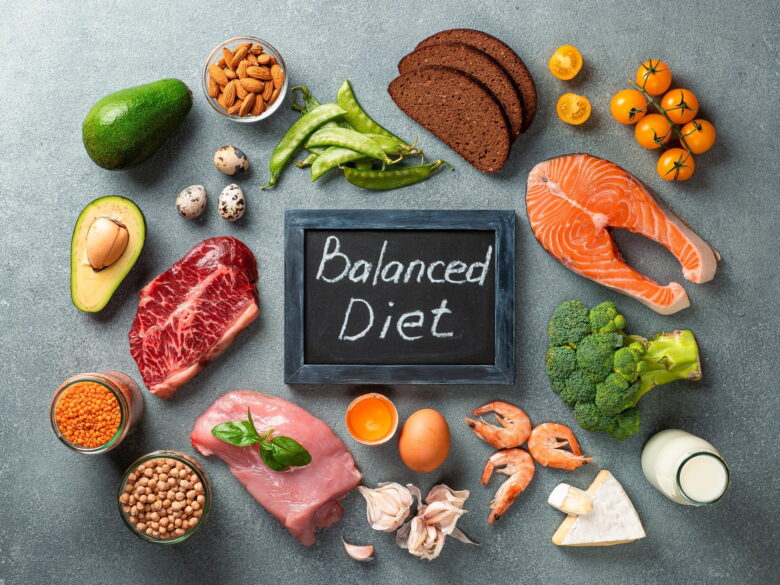A balanced diet provides the body with the resources it needs to function properly, stay healthy, and prevent disease. Many people think that dieting is just a short-term solution for weight loss, but a balanced diet is about developing healthy habits that last a lifetime. It provides the body with the right amounts of carbohydrates, proteins, fats, vitamins, and minerals, all in the right proportions. A balanced diet gives the body the energy to perform daily tasks, protects against disease, and supports long-term health.
The Impact of Variety on Your Diet
To ensure you get a varied diet, you need to eat various foods. Eating the same foods can cause nutritional deficiencies and limit diet benefits. A balanced diet should include various colors and types of foods, as each food has its own unique benefits. For example, leafy greens are rich in calcium and iron, while oranges and red fruits are high in vitamin A and antioxidants. Whole grains provide long-lasting energy, while legumes contain protein and fiber. By combining these foods, you ensure your body gets all the nutrients it needs.
Control Portion Sizes and Maintain a Balanced Diet
Overeating, even healthy foods, is one of the most common mistakes people make. Portion control is an important part of a balanced diet. Even if the food itself is healthy, overeating can lead to weight gain, lethargy, and digestive problems. By paying attention to hunger cues, chewing slowly, and eating smaller, more frequent meals, you can control portion size. Knowing your body’s true needs can help you avoid overeating calories and still feel full and nourished.
Why Staying Hydrated Is Important
People often forget to drink water when it comes to a balanced diet, but staying hydrated is just as important as eating. From digestion and circulation to maintaining body temperature, the body needs water for every activity. Drinking enough fluids throughout the day helps the body absorb nutrients better, boosts metabolism, and maintains stable energy levels. Replacing sugary drinks and sodas with plain water, herbal tea, or fruit-infused water will help you stay hydrated without adding empty calories. Make sure you drink plenty of water throughout the day to maintain a balanced diet.
Include Protein in Every Meal
Protein is essential for muscle recovery, energy, and feeling full. If you don’t get enough protein, you’ll feel worn out, weak, or hungry more quickly. Protein should be included in every meal, whether it comes from animal sources like fish, chicken, and eggs, or from plant sources like beans, lentils, tofu, and nuts. Protein helps maintain strong muscles and boosts metabolism, giving you more energy. Consuming protein throughout the day can help maintain your energy levels and curb cravings.
How Healthy Fats Help Maintain Balance
People used to think all fats were bad, but that’s not true. Healthy fats found in avocados, nuts, seeds, and olive oil are essential for hormone production, brain development, and nutrient absorption. A healthy diet includes small amounts of these healthy fats while limiting harmful trans fats and excess saturated fat found in fried and processed foods. Adding the right types of fat to your diet not only helps maintain nutritional balance but also makes food more delicious and satisfying.
The Importance of Dietary Fiber for Digestion
Dietary fiber is another important component of a healthy diet. It promotes digestion, regulates cholesterol levels, and helps maintain stable blood sugar levels. Eating more fiber-rich foods, such as fruits, vegetables, legumes, and whole grains, can help you feel fuller longer, making you less likely to overeat. Fiber also contributes to healthy gut flora, which is linked to better health and immunity. Eating more fiber-rich foods can improve digestion while maintaining a balanced diet.
Planning Meals for Better Balance
Planning ahead makes it easier to eat a balanced diet. A meal plan ensures you make healthy, planned food choices instead of impulsive ones. By planning meals and snacks in advance, you avoid relying on processed foods, manage your portion sizes, and ensure a balanced diet. Making a grocery list, cooking in bulk, and having healthy snacks on hand can help you incorporate a balanced diet into your daily routine. This habit makes it easier to make smart choices and reduces food-related stress.
Conclusion
Eating a balanced diet isn’t about adopting strict rules or giving up your favorite foods. It’s about finding and sticking to an eating pattern that supports your health, vitality, and overall well-being. Anyone can improve their diet by paying attention to variety, controlling portion sizes, staying hydrated, eating whole foods, and consuming the right amounts of protein, fat, and fiber. Planning your meals and paying attention to your body’s feedback can help you stay healthy long-term. With a few adjustments and consistent practice, a balanced diet can become a natural and enjoyable part of your daily routine.
FAQs
1. What’s the easiest way to start a balanced diet?
Incorporating different food groups into your meals is the easiest way to eat healthily. These food groups include vegetables, fruits, whole grains, proteins, and healthy fats.
2. How much water should I drink daily to maintain a balanced diet?
A beneficial rule of thumb is to drink about eight glasses of water per day, but the exact amount varies depending on your activity level, the weather, and your health.
3. Can I snack and still eat a balanced diet?
Yes, snacks can be part of a healthy diet if they are wholesome, such as fruit, almonds, or yogurt, rather than highly processed foods.
4. Do I need to take supplements to maintain a balanced diet?
For most people, whole, unprocessed foods are sufficient, but if you have a nutritional deficiency or a pre-existing health condition, your doctor may recommend supplements.
5. Can I follow a balanced diet with a cheat meal?
Yes, it’s okay to treat yourself occasionally, as long as your diet is largely healthy. Balance isn’t about perfection but about a general pattern.




